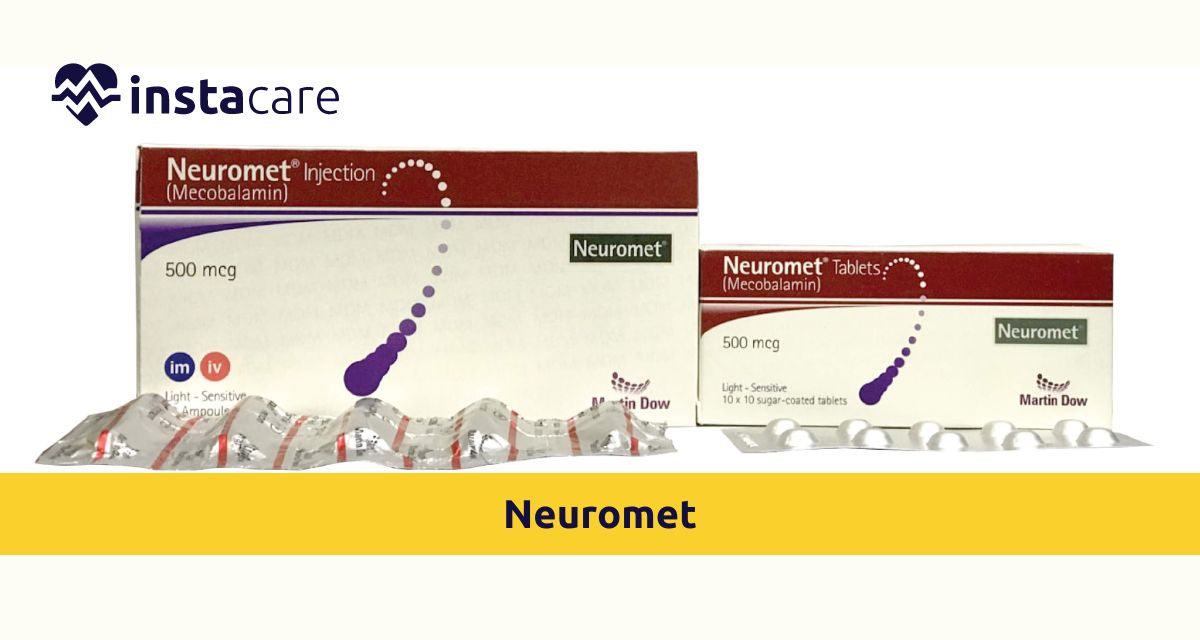Neuromet is an important medication for the treatment of neurological diseases, and every patient and medical professional needs to know its uses, possible side effects, and risks. As a result, in this paper, I outline the detailed composition and components of Neuromet, its therapeutic impact and significance in medical practice, likely side effects, and risks. In addition, at the end, several frequently asked questions on the use of Neuromet shall be answered.
1. What is Neuromet?
Neuromet is intended for the treatment of neurological disorders through acting on the neurochemical processes of the brain and nerves by helping equilibrate neurotransmitters that are associated with imbalances causing motor dysfunction, cognitive decline, and neuropathic pain. Neuromet oral tablets, extended-release capsules, and injectable solutions have been designed for optimal absorption and effectiveness related to a specific patient's need.
2. Uses of Neuromet
Neuromet is known to effectively treat the following neurological disorders by managing symptoms and promoting sound total neurological function:
Parkinson's Disease
Neuromet plays a critical role in the management of symptoms of tremors, rigidity, and bradykinesias by increasing dopamine levels in the brain. This, in return, enhances the motor control and movement of the body, thus improving the quality of life for individuals living with Parkinson's disease.
Alzheimer's disease
In Alzheimer's disease, it specifically slows the progression of cognitive decline that supports memory functions in some patients. Support is given in useful symptom relief through the modulation of neurochemical processes, and cognitive health is supported in the long run.
Multiple Sclerosis
Neuromet reduces the frequency of relapses in a patient with multiple sclerosis, ensuring the effective management of symptoms associated with this autoimmune condition. By stabilizing the progress of the disease, it greatly facilitates smooth symptom management overall and a better life.
Peripheral Neuropathy
Neuromet relieves neuropathic pain and sensory disturbances
typical of diseases that impair peripheral nerves. By alleviating these
symptoms and enhancing sensory function, it makes a lot of difference in coping
with the life of a person with a nerve abnormality.
Having wide functional activity to modulate neurotransmitter activity in a versatile way, Neuromet is among the new remedies that are important in clinical practice for the pharmacotherapy of a wide scope of different symptoms in diverse diseases.
3. Importance of Neuromet in Clinical Practice
Neuromet is important in medical practice for the targeted treatment of neurological disorders, dealing with exact neurochemical pathways that take part in the disease process. By restoring neural functions, it enhances patient outcomes and quality of life. Health care providers incorporate Neuromet into long plans of treatment with a view to more than the relief of symptoms, but also to retard disease progression and preserve neurological functions over time.
View More: Supravit - M Tablet - Uses Side Effects And Price In Pakistan
4. Neuromet Side Effects
As with all drugs, Neuromet is expected to cause a variety of side effects in patients. Among them are:
Gastrointestinal Disturbances
There may be incidences of nausea, vomiting, or diarrhea in patients, especially in the initial stages of dosing. These effects are usually of lesser degree as the patient becomes stabilized on medication or as dosages are modified.
Central Nervous Effects
In some patients, there have been reports of dizziness or somnolence at the beginning of Neuromet therapy or at the time of dose titration. Reduced cognitive or motor abilities have been experienced with this drug that interferes with coordination and concentration; however, these may become less with time as the body adjusts to this drug.
General Fatigue
Many patients feel drowsy or tired throughout the day. They cannot carry out their daily activities. This could be due to an imbalance caused in the neurotransmitter pool due to the effect of the medication, or it might be a compensatory mechanism of short duration in response to treatment. Energy management can best be done through an alteration in the daily activity protocols or through discussing alternative dosing schedules with healthcare providers.
Although these reactions are mild and transient, in some patients severe allergic, mood symptoms could be witnessed. Patients should not delay in reporting these special symptoms to the physician to get appropriate management and treatment. Dosage adjustment and change in formulations can help in addressing the side effects so that treatment remains effective.
5. Risks Attenuated with Neuromet
Apart from side effects, some of the risks associated with Neuromet include:
Drug Interactions
It interferes with other drugs, either by affecting their potency or increasing the risk for certain side effects. Healthcare providers must always be aware of this.
Long-term Use Concerns
Corresponding to the long period of use of Neuromet, some individuals could develop tolerance or dependence. Health professionals should continuously monitor this, and reassessment may be necessary from time to time to continue reaping therapeutic benefits with minimized risks.
Special Population Considerations
Populations requiring special precautions are pregnant or breastfeeding women or those having specific medical conditions. For this, preferred therapeutic alternatives for either practical or experimental reasons are available in the case of Neuromet.
Conclusion
Neuromet is generally taken as a significant drug used in the treatment of neurologic disorders. Its long list of benefits comes with numerous potential side effects and associated risks. Understanding uses importance, side effects, and associated risks guides patients and healthcare providers in making an informed treatment decision. Understand Neuromet through professional advice and proactive management. This can always be optimized, given proper guidance in the use of Neuromet.

